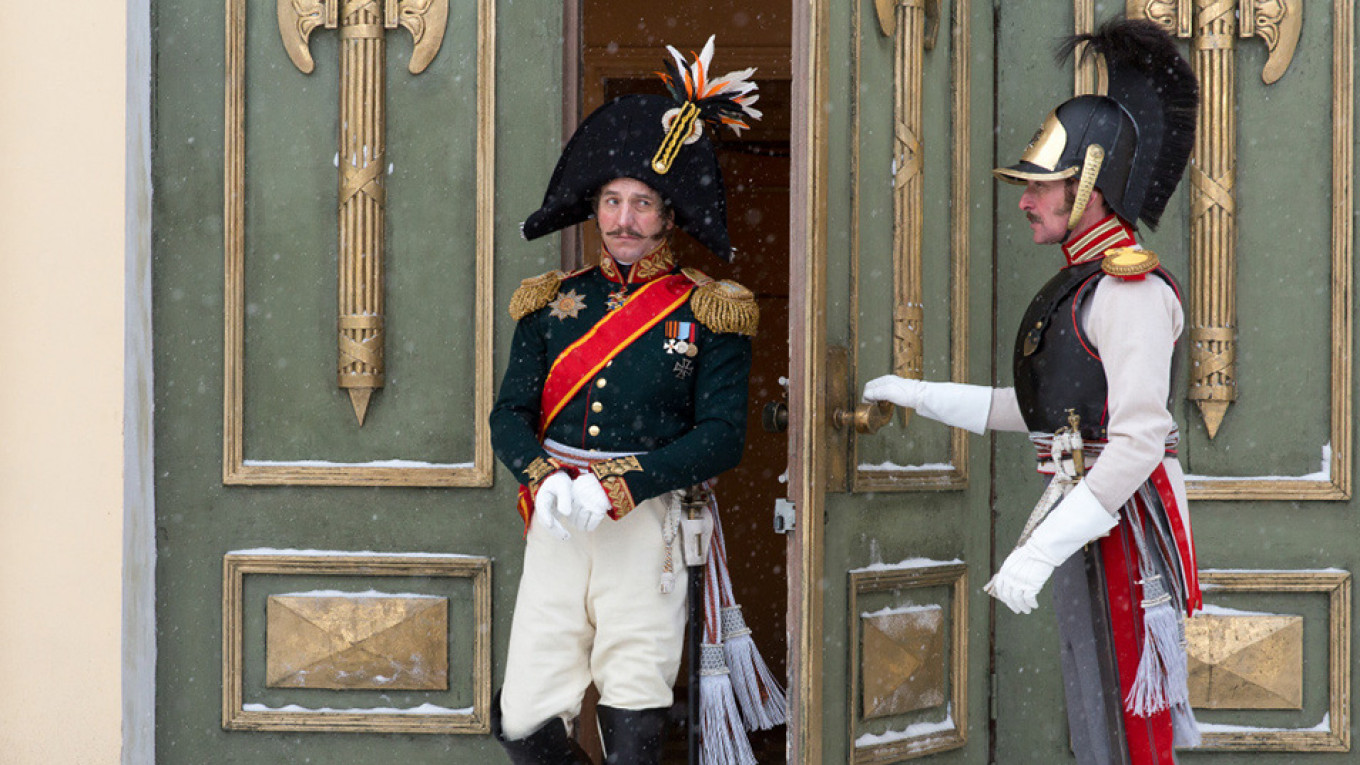
Just before the New Year’s holidays Russian filmmakers released their best bets for vacation blockbusters. One of the most promising films was “The Union of Salvation,” a lush, cast-of-thousands, historical saga that tells the story of the Decembrists, young Russian noblemen who organized a revolt against the monarchy in December 1825.
Directed by Andrei Kravchuk and co-produced by state television Channel One general director Konstantin Ernst and his associate Anatoly Maximov, the film begins in 1814 as the main characters chase Napoleon’s army out of Russia and back to Paris after the French rout of Moscow. It follows them upon their return during a time of hope for liberal changes in Russia, and it ends when they face the hangman’s noose or exile for their insurrection against the new Emperor Nicholas I.
The cast of fine actors, magnificent costumes and sets, and spectacular special effects make for riveting cinema. Although there are no published box office tallies at this point, it was the second most popular film the night it opened nationwide.
But despite its popularity in theaters, critics and the public are sharply divided about the film. There is only thing everyone agrees on: It’s not about the Decembrists in 1814. It’s about the protesters today.
As the film was being made, Russia was experiencing some of the largest protests of the decade, especially in Moscow. And in the film and in real life, the unrest and protests ended tragically for the protesters.
Thumbs down
Most of the critical comments focus on the film as nothing more than “cinematic patriotism,” “a monarchist blockbuster” with the moral that any rebellion is pointless. Some critics called it a hymn to imperial power that is always right and always above the law. The last idea was, in fact, repeatedly emphasized in the film with the words “My will is law” said by Emperor Nicholas I.
Larisa Malyukova, columnist at Novaya Gazeta, wrote that “the Union of Salvation” was a new blockbuster that continued the traditional Soviet and Russian style of cinematic patriotism on an imperial scale. She calls it a visual illustration of the harm of revolution.
Film critic Anton Dolin agreed. He wrote that the film is a monarchist picture show about the Decembrist revolt that mercilessly condemns the rebellious intellectuals.
“The filmmakers decided to take advantage of the uprising on Senate Square to make the case that any rebellion is pointless. The film is a kind of warning. This, they say, is what intellectual ferment (in this case, aristocratic ferment) leads to — nothing good,” wrote film critic Yaroslav Zabaluyev.
Thumbs up
On the other end of the spectrum, the film was heartily endorsed by Russia’s Culture Minister Vladimir Medinsky, which is not surprising considering that the government provided about a third of the almost billion-ruble budget. Medinsky even promised to include it in the compulsory school curriculum.
But some critics had a more positive view. Russian journalist and editor-in-chief of Carnegie.ru Alexander Baunov wrote it would be easy to dismiss the film, made as it was with state money and support of the country’s main propaganda television channel. But he found the characterizations — collective portraits rather than well-defined individuals — were not good on one side in bad on the other. In the collective portrait of Decembrists, there were no good or bad men, just as the collective portrait of the tsar – Nicholas I and Alexander I — was also not all good or all bad.
But he found a possible hero: the collective portrait of the liberals as personified by General Miloradovich, Senator Mordvinov, and other characters. They wanted “change, but change without war or Jacobinism… [they] valued people over ideas, even though they shared the ideals of the Decembrists almost completely.”
The third way
This approach opens up the possibility of a more positive reading — and a possible way out of Russia’s endless battle between leaders and people. At the end of the film, one of the rebels comes down off the gallows and recalls a moment from 1814 when Emperor Alexander I shared champagne with the soldiers to celebrate their victory over Napoleon. This is, perhaps, a suggestion that if the leader was able to celebrate the victories and discuss defeats with his people, there would have been no rebellion and no tragic consequences.
In this reading, “The Union of Salvation” is not about the futility of rebellion or a hymn to imperial power, but about the possibility of a dialog between leader and subjects based on a recognition of good intentions — a lesson as crucial today as it was in 1825.






